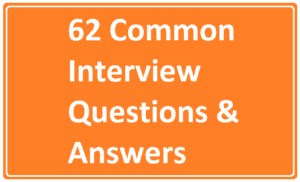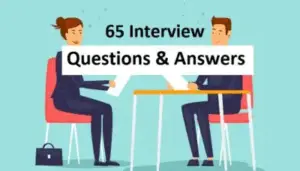To solve the 7 classic interview questions, the HR director’s best answer is enough to read this! (With analysis of complex problems) | Application skills sharing
“There will always be some questions that make you overwhelmed during the interview . Many people will want to know how to answer these questions , because different industries and companies value different points; the interviewer is also one of the influencing factors, everyone has Your own thoughts, and the best answers suggested by the HR manager are provided below for reference.”
A quick tour of the 7 most common interview questions
- Please briefly introduce yourself
- Why did you leave the former company? Your reason for leaving?
- Why do you want to come to our company?
- What do you think are your weaknesses?
- What is your expected salary?
- Under what circumstances would you choose to invest in a company? Under what circumstances would you choose to leave?
- Do you have any more questions to ask?
Before going to the company for an interview, the interviewee should think about how to answer the following questions in advance. The answers should be as truthful as possible, and should not lie, so as to avoid greater disputes after admission. For example: when the interviewer asks if he can cooperate with overtime, although he is unwilling, he is willing to cooperate in order to be admitted; when he is asked to work overtime after admission, he is dissatisfied and may even refuse, and the supervisor will also feel troubled.
The following only lists the 7 most difficult interview questions to answer and some suggestions. You can refer to the following suggestions to make the most suitable responses. Please avoid canned answers.
Also Read:- Tips for Being Impressive in a Job Interview
1. Briefly introduce yourself
Regardless of whether the interviewer has carefully read the resume or autobiography, there is no simple face-to-face explanation. Self-introduction is the first question that is often encountered during an interview. It is recommended that the introduction should be short and focus on the description of one’s own expertise and work experience, and the background part should be simply described, unless the interviewer asks for further details.
Generally speaking, companies don’t want to know about your ancestors’ eight generations, net worth, or the story of Yu’er’s struggle to become a better player since he was a child. As long as you mention what school and department you are in, you can add special performance or at most. Awards can be.
The next focus is on the part of work experience. If you start from the first job, you can speed up the speed, and the final job needs to be more detailed. Briefly explain what you did in your previous job, which department you belong to, what your job title is, what you are mainly responsible for, your specific achievements and related achievements, etc. Answers such as performing tasks assigned by your supervisor should not be answered so that the interviewer cannot judge your job content and ability.
In addition to explaining your own experience, self-introduction is a way of self-marketing. The interviewer can learn more about you from the self-statement and form the first impression of you. If the first impression is broken, it is difficult to save. Through a short speech, you can roughly know the person’s expressive ability or basic personality, so don’t talk too much or go overboard.
When I first came out of society, I once had an interview experience. There were three interviewers sitting opposite each other. As soon as I sat down, the other person took the computer and said, “Please introduce yourself for three minutes. Let’s start.” I was stunned. I made a random introduction, and finally said that I still have a lot of expertise, you can ask me, etc. Because of the lack of self-introduction, and I did not introduce my expertise in an organized manner, of course, this school did not admit it later.
It is recommended that you prepare several versions at a different times, one minute, three minutes or five minutes, first practice in front of the mirror, or practice in front of a friend, or you can ask the other person to help make an evaluation.
Also Read:- Why am I not getting any interview calls

2. The reason for your resignation?
” Ah, the previous company’s treatment was not good, it was too fucked up, and there was no overtime pay for working overtime. ” Can you tell the real reason for leaving? Can you criticize the former company?
Most of the interview strategies will say not to criticize the former company. I think this part depends on the situation. For example, because I can’t accept overtime, but I need to work overtime in the former company, I put it up at this time, just to test the current interview. the company’s bottom line. If the company does not want employees to work overtime, you can accept the statement that you left at the previous company, otherwise, it means that you have no chance of being admitted.
Of course, there are also some safer sayings, such as “What are the circumstances of the family so I left?”, “I want to have more challenges”, or other conservative answers are also acceptable, but the interviewer probably just listens to these kinds of answers. , just like the reason for leaving the resignation application is “career planning”, but we all know that it is not the main reason.
Also Read:- Interview Skills: Interview Questions and Answers for Junior Accountants
Jobs with a high rate of job change! How to prepare before changing jobs?
3. Why do you want to come to our company?
“Because your company’s products are great because you want to be in this position, because your company is famous,” and so on, these canned responses to the interviewers heard a lot.
If possible, first get a detailed understanding of the company’s products and the job content you want to apply for, and express your thoughts on the company. At the same time, combining your own experience and even providing some good suggestions will be better than unrealistic empty words. it is good.
Also Read:- 65 Interview Questions with Answers for Dubai – UAE
4. What do you think are your weaknesses?
What to say about the shortcomings of the interview? This is a trap question in the interview. The disadvantages are harder to answer than the advantages. Most people don’t want to expose their scars and say that they are not good, but why does this question appear in the interview? The key is to see if you have the ability to introspect yourself, and what you can do to deal with your shortcomings.
For example, “When I encounter a task, I usually execute it immediately. I was once told by my supervisor to rush my head. Later, I will repeatedly remind myself to pay attention, and I will also ask my colleagues to remind me of the things I should pay attention to.” Or: “When I encounter a task, I will clarify the cause and effect before executing it, so the execution speed is not efficient enough. Later, I will remind myself and set the work completion node to improve.” Or: “The time management is not good enough, and there is a lot of work at the same time. It’s easy to get confused when we come together, so I will use a mobile APP to help me manage my work.” Everyone’s situation is different, so there is no need to answer according to the above example.
Also Read:- Top 15 Interview Questions with Answers in Qatar

5. What is your expected salary?
When I was an interviewer, I usually started to introduce the company’s working hours and welfare-related systems to the interviewer when I had the opportunity to want to be admitted. At the same time, I did salary communication. It should be emphasized here that each company and each supervisor have different styles. Some companies will evaluate the position first, give a salary range for the position (usually also disclosed at the time of recruitment), and set academic experience and expertise, etc. Conditions, so as long as you meet the conditions and are competent for this position, you can give a specific salary.
The ideal salary system must be competitive with external companies, in order to win against other companies when robbing talents; for internal fairness, it must be avoided that the salary gap between colleagues with the same conditions and the same position is too large, and even newcomers are more than seniors. Staff are very tall, leading to internal disputes.
But to be honest, most companies may not have a complete salary system, and the salary level is negotiable. Of course, most of the time, if the interviewer expresses his expected salary to be 25K to 30K, the interviewer will naturally think that 25K is acceptable, so 25K will be used as the standard, and even cut down.
Therefore, you must first set a bottom line that you can accept, narrow the expected salary range during the interview, and avoid too much vague space; at the same time, be careful not to raise it too high, and you can’t make sense, the company may think it’s better to find someone else. .
And many younger friends, who often have no work experience, are hired by the company with basic salary and do not know how to deal with it. The main reason is that you are not familiar with the market and job information. If you can clearly understand where the salary should fall with the same seniority and the same position in the market, you will be more confident when negotiating the price .
To put it bluntly, everything depends on who needs whom more. If the company decides to hire, within the acceptable range, it is willing to accept the salary offered by the candidate; if the company thinks it is optional, it will not give in one step.
Also Read:- Interview Skills and Techniques
6. Under what circumstances would you choose to invest in a company? Under what circumstances would you decide to resign?
This is a private room question in my interview. When I am looking for colleagues who can work with each other, I will ask each other like this, and there is no standard answer. For example, the other party answers: “I hope there is an opportunity for further education”, “I hope everything in the company is legal”, or “I hope someone can take me at work”, etc. I will consider the actual situation of the company. On the one hand, I will respond to the interviewer, and on the other hand, I will evaluate who May stay longer.
In the same way, by asking the interviewee under what circumstances would they choose to leave the job , you can know what the other party cares about the most , whether your company can let the other party stay longer, or what areas you should pay special attention to when leading.
Also Read:- Typical Interview Questions and Answers

7. Do you have any questions to ask?
The last interview question is very important. What I appreciate during the interview is the interviewer who can ask further questions based on the previous interaction and what the interviewer said. This means that they have had similar experiences before and pay attention to listening and responding during the interview. soon. Second, if you can understand the attributes of the company, department, or position before the interview, you can also imagine the questions to ask in advance.
In addition, there are some versatile interview questions, such as: “Want to know the development prospects of this position?”, “If I have the opportunity to be admitted, what can I prepare before reporting?”, “What parts can I strengthen first before I can? better for the job?” and so on.
You can also ask the contact information of the supervisor or human resources, if you have some advanced ideas for this position, whether you can provide additional suggestions, etc. As for the salary and benefits, I think it can be raised, and the rights and obligations can be clearly inquired. However, if I were the interviewer when I felt that I had a chance to be hired, I would directly ask the interviewee about the expected treatment first, instead of waiting for the other person to ask questions.





























